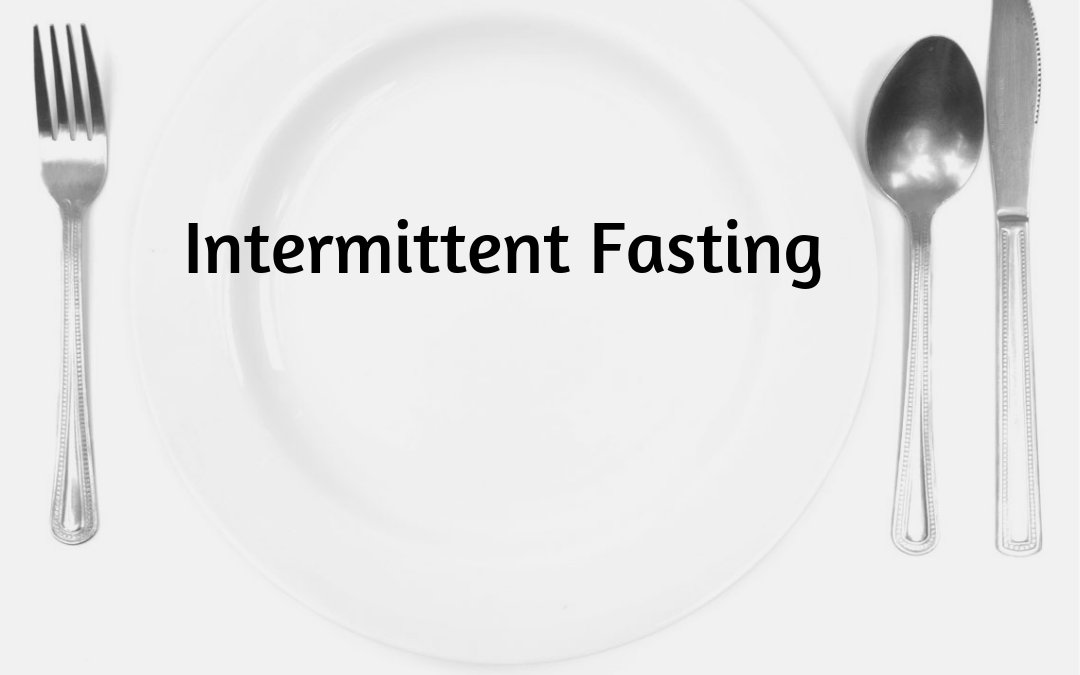Intermittent Fasting is about controlling the ‘eating window’. You eat the same amount of nourishing food as you normally would, but you eat it during a specific time frame. However, it should be planned …don’t just skip breakfast on a whim and not be prepared with enough nutrition for the rest of the day. Over time, this could lead to nutrient deficiencies and the slowing of your metabolism. THIS IS NOT ABOUT CALORIE RESTRICTION or STARVING YOURSELF!!
Easy Intermittent Fasting
An easy way to do Intermittent Fasting is to simply stop eating for the day about 6 pm, and then don’t eat again until 9 or 10 am the next morning (yes sleeping hours count). Your eating window is 8-9 hours. You still eat the same amount of food, just within that 8-9 hours.
In the morning, cortisol (your stress hormone) is naturally elevated. As long as there isn’t insulin present (because you haven’t eaten anything, especially carbs), cortisol can easily perform one of its many jobs and allow your body to burn stored fat. This is one of the ways it helps with fat loss. This also gives your digestive system a break.
Before I started eating low carb in the morning, my body was expecting those carbs at breakfast. Anytime I skipped breakfast, either intentionally or by accident, I felt terrible…nauseous, light-headed, headachy, low energy. However, once I became ‘fat adapted’ after eating high fat low carb for a period of time, I was easily able to integrate intermittent fasting a few times a week.

Intermittent Fasting and Your Brain
BRAIN FOG. You can’t think clearly, can’t focus, can’t remember things. So annoying. It can slow you down. There are multiple causes but sometimes it’s your diet and the same way of eating that causes brain fog can lead to Alzheimer’s Disease.
Do you want to know an easy way to protect your health and your brain? EVERYONE should answer ‘yes’ to this.
Even if you think you’re too young to worry about those things now, you need to know that the ‘seeds’ that lead to Alzheimer’s (and many other preventable diseases…yes, I said preventable, even in those with the gene) are planted in your 20s and 30s by the choices you make.
Have you ever heard of the word AUTOPHAGY? Me neither…until a short time ago when reading about Intermittent Fasting.
AUTOPHAGY is your body’s way of getting rid of worn-out cellular components anywhere in the body. It’s a really important process that helps to prevent Alzheimer’s and other diseases like Cancer. You WANT your body to be able to carry out this self-cleaning process.
What stimulates this process of autophagy?
Intermittent Fasting.
What inhibits this process of autophagy?
Eating.
Your brain is what makes you who you are. Protect your brain.
Click the link to read more about fasting and autophagy: https://

More About Fasting and your BRAIN: Skip breakfast and be smarter??
Intermittent Fasting is an easy way to increase BDNF which is Brain-Derived Neurotrophic Factor. It’s like Miracle Grow for your brain.
BDNF helps your brain grow new neurons, protect the neurons you already have, and allows your neurons to make NEW connections.
What does this mean for YOU?
👍You can improve your brain’s ability to remember and to learn new skills.
👍You can think more clearly.
👍You can be smarter and more efficient.
👍You can protect your brain from dementia…it matters, even if you’re young and healthy. The path towards Alzheimer’s starts in your 20s and 30s!!
Intermittent Fasting and Inflammation
Inflammation is one of your body’s mechanisms to promote healing.
Just like cortisol, inflammation is necessary and beneficial. TO. A. POINT.
When inflammation is chronic, it is associated with all kinds of health issues including heart disease, cancer, and dementia as well as autoimmune diseases such as lupus, MS and rheumatoid arthritis.
INTERMITTENT FASTING can reduce inflammation. How cool is that? Such an easy way to reduce your risk of disease and to reduce the symptoms associated with those diseases if you already have them.
IMPORTANT!!!
You should always consult your health care provider before trying Intermittent Fasting, especially if you are under his or her care for a diagnosed condition (i.e. Diabetes) and/or if you are using prescribed medication of any kind.
Also, pay attention to your body. Intermittent Fasting shouldn’t be uncomfortable. If it is, your body isn’t responding well. Either try a shorter duration or try again later, perhaps after transitioning to a low carb way of eating.
To Summarize
Benefits of Intermittent Fasting:
✅better brain function
✅improved insulin sensitivity
✅enhanced fat loss
✅activation of autophagy (where the body gets rid of cellular debris)
✅can increase lifespan
✅preserve lean muscle tissue
✅boosts body’s ability to grow new brain cells, protect the ones you have and strengthen connections between existing neurons
✅helps your body break down excess cholesterol
✅reduced inflammation
How to:
⏰Stop eating after dinner, around 6 pm. No bedtime snack.
⏰Eat again the next morning around 9 or 10 am, or adjust those times to allow a 15-16 hour fasting period.
⏰Eat healthy foods including lots of good fats (avocado, olive oil, coconut oil), vegetables and proteins.
⏰Don’t restrict your food intake. Just eat the amount you normally eat within those 8 hours.
🔅Start with a 12 hour fast, and increase by an hour each time, up to 16 hours, and pay attention to how you feel. Women are sometimes more sensitive to the hormonal effects of fasting and may do better with a slightly shorter fasting period (12-15 hours).
IMPORTANT: Intermittent fasting doesn’t work for everyone. You need to pay attention to how you feel. If you’re really hungry one morning, it might be a sign that you should postpone the fasting to another day. If you don’t feel well during fasting, try again another day. AND if you have a medical condition, talk to your healthcare provider FIRST. Don’t use fasting if you are pregnant or nursing.
🔑Many people find fasting easier once they’ve been eating low carb for a while and their body no longer relies on carbs for breakfast. If you’d like some help in learning how to eat low carb, contact me to see if my CHANGE Method will work for you.
If you want some great low carb breakfast ideas, click HERE to subscribe and get my Better Breakfast Recipe Book.
You can still enjoy coffee on the mornings that you fast, and adding fat to your coffee doesn’t interfere with the fast either. Think butter, MCT oil and heavy cream. Learn more by downloading the Top 5 Coffee Add-Ins pdf.
You might also like: I love coffee… or STEP AWAY FROM THE CEREAL!
References:
https://www.healthline.com/nutrition/10-health-benefits-of-intermittent-fasting
https://www.dietdoctor.com/intermittent-fasting

